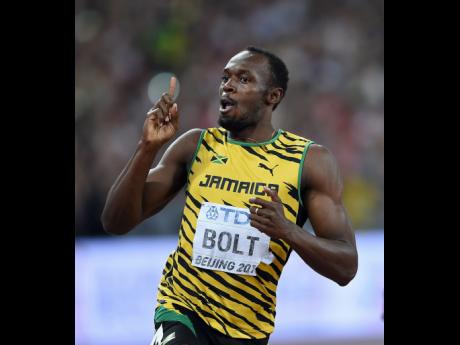Getting ready for World Juniors
In 2002, there was no clue that Usain Bolt would become the best 100-metre, sprinter in history. Save for a forlorn Class Three effort at Boys and Girls' Champions two years earlier, he had concentrated on the 200 and 400 metres with much success. The penny dropped at a training camp hosted by the G.C. Foster College.
The nation's finest junior athletes were assembled at the G.C. Foster College for an ongoing training camp. It was a key plank of Jamaica's preparation for the World Junior Championships which were set for Kingston in July 2002. Bolt lined up against many of the best junior 100-metre sprinters of the day and cleaned their clocks. Those present were stunned by his speed. It was a glimpse into his famous future.
In those days, training camps were a standard part of preparation for our junior teams. In the late 1990s, stalwarts like Ian Forbes, Juliet Parkes and Brian Smith manned these camps. They ensured that our juniors faced the world's best at their best.
There was even a time when support camps were held outside of the Corporate Area, with the late Constantine Haughton sharing his expertise with those who couldn't reach Kingston.
The conversion of Melaine Walker to the 400-metre hurdles was done at camp by World Junior head coach Stephen Francis with the blessing of Walker's high school Raymond 'KC' Graham after an injury had threatened her 2000 season. Walker took a bronze in the World Juniors in her new event and the rest is history.
In 2002, the juniors were housed each weekend at G.C. Foster and their school coaches freely attended and shared their knowledge. The out-turn was a brilliant performance by the team when the big show rolled around. Bolt famously won the 200m. Sherone Simpson, Kerron Stewart, Anniesha McLaughlin and Simone Facey clicked to gold in the 4x100 metres. Facey and McLaughlin took silver medals in the 100m and 200m respectively, with Jermaine Gonzales and Sherul Morgan third in their respective 400-metre finals.
Walker moved up to second in the hurdles, behind a world junior record by Lashinda Demus of the United States.
It's a pity that the World Junior Championships won't come to Jamaica in 2016 but that doesn't mean we shouldn't prepare for it well. The aforementioned training camps have largely dropped off the calender. Where team members come from schools with self-sufficient programmes, they can arrive ready for national duty. That isn't often the case.
In 2010, distance ace Kemoy Campbell was slowed when funding for track at his school ran out after Champs. A camp, like the one that heralded the sprint future of Bolt, would likely have seen to his welfare. Perhaps, a better prepared Campbell would have advanced past the first round on the 1500-metres in the World Juniors in Moncton, Canada.
Our top seniors largely have camps of their own, but our juniors suffer if left alone. Our medal haul at the World Juniors tell the story. In 2002, the team's 11-medal performance may have been boosted by brilliant home support. Since then, the take has settled at lower levels.
Jamaica garnered nine medals in 2004, eight in 2006, six in 2008, three in 2010, five in 2012 and six in 2014 at successive stagings of the Under-20 championships. This year, a three-day camp helped to prepare Jamaica's 2015 Pan-Am Junior team for a 13-medal haul.
The 2002 World Junior Championships in Kingston were wonderful. The support by a capacity audience, night after night, and the performances by the likes of Carolina Kluft, Blanka Vlasic, Meseret Defar, Darrell Brown and Bolt make it worthwhile for the authorities to consider a return to Kingston at some point in the future. In the meantime, it makes sense to prepare well for the 2016 renewal, wherever it is staged. The revival of preparatory junior camps would be a good way to get out of the blocks.
- Hubert Lawrence was present at the 2002 World Juniors.


